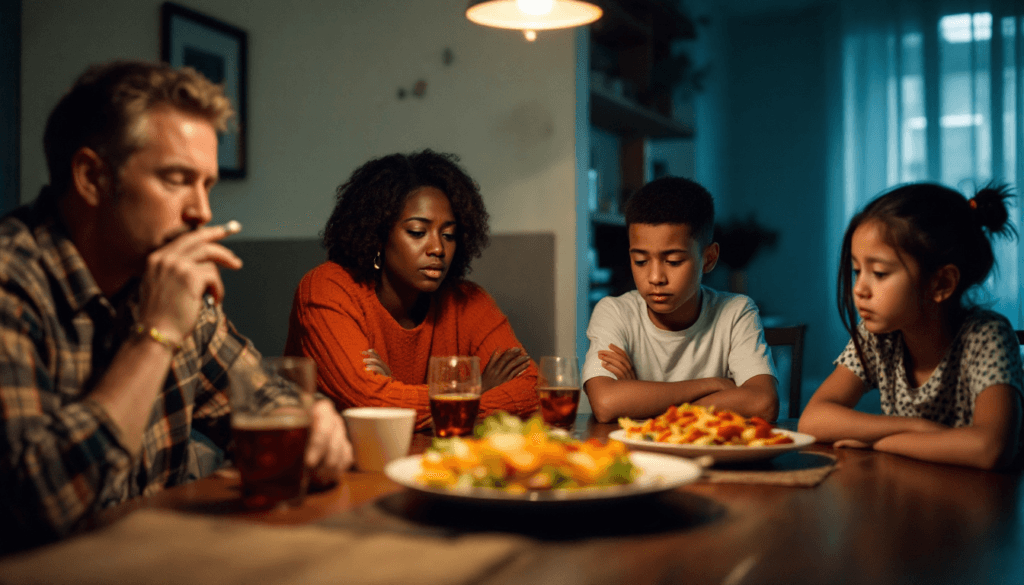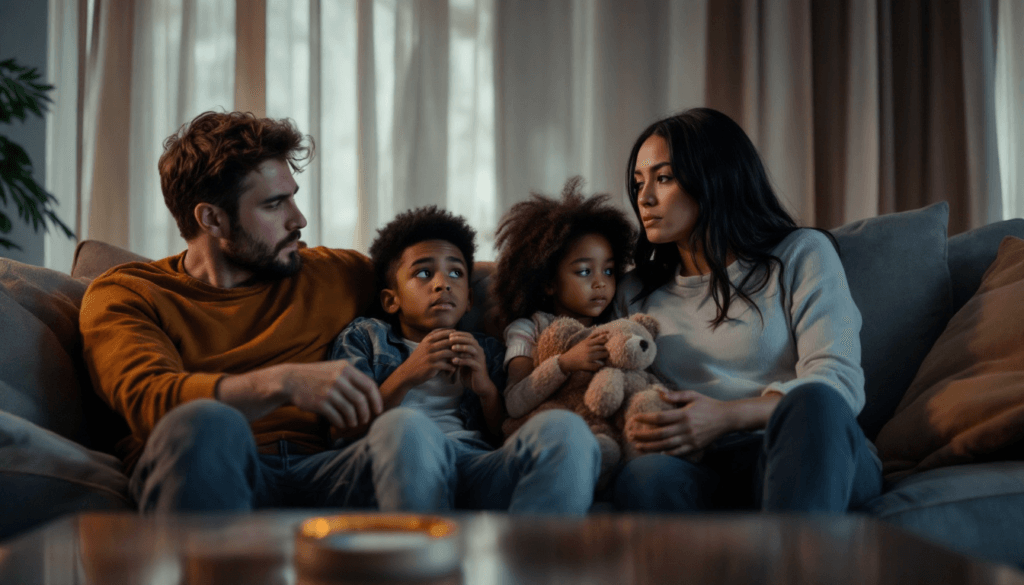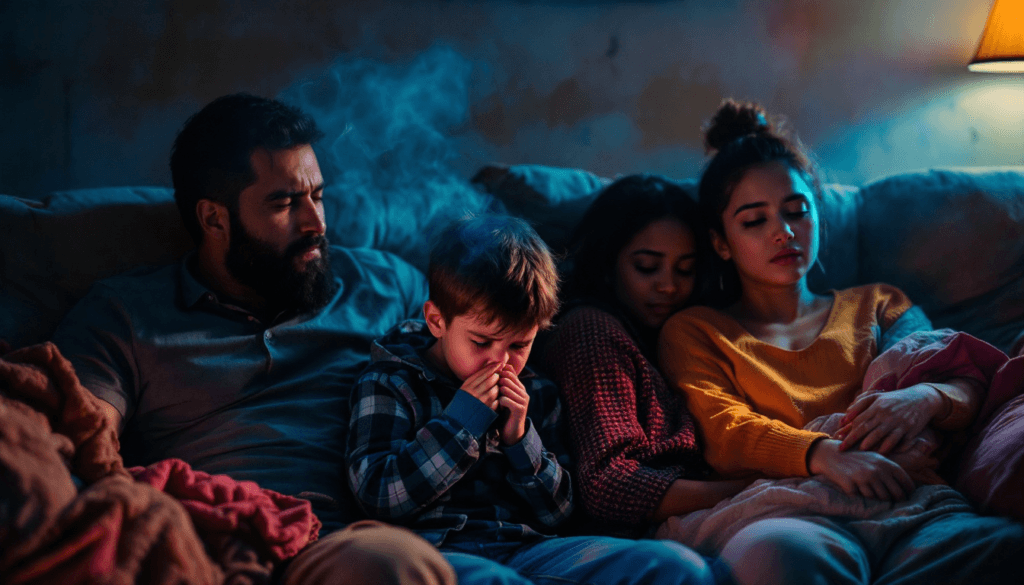How Smoking Affects Your Family’s Health and Future


Written By: Aman Doda
Last Updated: 19/01/2025


- How secondhand smoke harms your family’s physical health.
- The emotional toll smoking takes on your relationships.
- The financial strain smoking places on family resources.
- Why quitting smoking is one of the best gifts you can give to your loved ones.
- Real-life testimonials to inspire you to take action.
- 01: Introduction: Smoking Isn’t Just Your Problem—It’s a Family Problem
- 02: How Secondhand Smoke Harms Your Loved Ones
- 03: The Emotional Strain Smoking Brings to Your Relationships
- 04: The Financial Burden Smoking Places on Families
- 05: How Smoking Impacts Your Role as a Parent or Partner
- 06: Breaking the Chain: How Smoking Affects Future Generations
- 07: Secondhand Smoke: How It Harms Your Family’s Health
- 08: Hardik’s Story: A Real-Life Testimonial of Breaking Free
- 09: Smoking and Financial Security for Your Family: The Hidden Ripple Effect
- 10: Breaking Free: How Quitting Smoking Can Transform Your Family’s Future
- 11: FAQs: How Smoking Impacts Families and How to Quit
- 12: Conclusion: Your Family Deserves a Healthier, Happier Future
- 13: Disclaimer
How Smoking Affects Your Family’s Health and Future
Smoking doesn’t just harm your lungs or health—it silently affects everyone around you, especially your family. Every puff of smoke you inhale releases harmful toxins into the air, exposing your loved ones to the dangers of secondhand smoke.
But the impact doesn’t stop at physical health. Smoking also places emotional strain on relationships, creates financial challenges for the household, and even sets an example for children that could lead them down a dangerous path. It’s a ripple effect that touches every aspect of family life, often in ways we don’t immediately realize.
💬 When you smoke, it’s not just your future at stake—it’s the future of your children, your partner, and everyone who loves you. Imagine the joy of a home where no one breathes in harmful toxins and everyone feels safe, supported, and inspired by healthier habits.
Worried about how smoking might be affecting your family? Join our FREE Masterclass to learn the steps to break free from nicotine and create a healthier environment for your loved ones.
The Immediate Impact of Smoking on Your Family’s Health
Most smokers are aware of how smoking damages their own health, but many overlook how secondhand smoke affects their family. Secondhand smoke contains over 7,000 chemicals, hundreds of which are toxic, and at least 70 are known to cause cancer. When you smoke in your home, car, or even outside, the toxins linger, creating a hazardous environment for your loved ones.
How Secondhand Smoke Affects Adults in the Family
- Increased Risk of Heart Disease: Exposure to secondhand smoke raises the risk of heart attacks and strokes in non-smoking adults.
- Respiratory Problems: Family members, especially those with asthma or allergies, can suffer from worsened symptoms when exposed to smoke.
- Weakened Immune Systems: Regular exposure to toxins in secondhand smoke weakens immunity, making family members more susceptible to infections.
How Secondhand Smoke Affects Children
Children are among the most vulnerable to secondhand smoke. Since their bodies and lungs are still developing, even minimal exposure can lead to severe health problems, including:
- Frequent Respiratory Infections: Bronchitis and pneumonia are common in children exposed to secondhand smoke.
- Asthma Attacks: Smoke can trigger or worsen asthma, making it difficult for children to breathe properly.
- Sudden Infant Death Syndrome (SIDS): Babies exposed to secondhand smoke are at a higher risk of SIDS.
- Middle Ear Infections: Children exposed to secondhand smoke often suffer from repeated ear infections, leading to hearing problems over time.
💬 Fact: According to the World Health Organization (WHO), nearly 1.2 million deaths worldwide are caused by exposure to secondhand smoke annually—many of these victims are children and non-smokers.
Thirdhand Smoke: A Hidden Danger
Even after you’ve put out a cigarette, toxic residues linger on surfaces like furniture, clothes, and carpets. This is known as thirdhand smoke, and it can be especially harmful to babies and toddlers who crawl on floors or put objects in their mouths.
Learn more about the dangers of secondhand and thirdhand smoke in our blog, “Why Quitting Smoking Protects More Than Just You.


👉 “Wondering how to break free and reclaim your time? Download our FREE Ebook to learn practical strategies to quit smoking and live your best life.”
Emotional and Psychological Impact on Your Family
Smoking isn’t just a physical health issue—it takes a significant emotional toll on your family members. Watching someone they love struggle with addiction can create feelings of fear, helplessness, frustration, and even resentment. These emotional burdens can affect relationships in profound ways.
How Smoking Creates Emotional Distance
- Worry and Fear: Your family may constantly worry about your health, fearing the long-term consequences of smoking. This stress can create an emotional strain, especially if they feel powerless to help you quit.
- Conflict and Frustration: If your family has asked you to quit and you haven’t, it can lead to repeated arguments and a sense of disappointment.
- Guilt in Parents Who Smoke: If you’re a parent, you may feel guilty knowing that your habit is exposing your children to secondhand smoke and setting a negative example.
Impact on Children’s Emotional Health
Children often look up to their parents as role models, and when they see you smoking, it can send mixed signals. Even if you’ve told them smoking is harmful, your actions speak louder than words.
- Fear for Your Health: Kids may worry about losing you to smoking-related diseases.
- Normalizing Smoking: Seeing a parent smoke can normalize the habit, increasing the likelihood that children will pick up smoking later in life.
- Emotional Insecurity: Children may feel neglected if smoking interrupts quality family time, such as when you step away frequently for cigarette breaks.
Smoking’s Effect on Relationships with Spouses or Partners
Your smoking habit may also affect your relationship with your spouse or partner.
- Health Fears: Your partner may constantly worry about your health and the financial strain of smoking-related illnesses.
- Lifestyle Conflicts: Smoking can create a divide if your partner doesn’t smoke or disapproves of the habit.
- Reduced Intimacy: Smoking causes bad breath, stained teeth, and an overall odor that can affect intimacy and physical closeness in relationships.
💬 A husband once shared in a QSFS testimonial how his wife’s frustration with his smoking led to frequent arguments. After quitting, their relationship improved dramatically, with more mutual respect and quality time together.
Explore how smoking affects your relationships in our blog, The Ripple Effect of Smoking on Your Personality and Self-Confidence.


Financial Strain on Your Family: Smoking’s Hidden Cost
Smoking doesn’t just burn your health—it burns through your finances as well. And when you’re supporting a family, the financial strain of smoking can have far-reaching consequences that ripple across their lives.
How Smoking Drains Family Finances
- Direct Costs of Smoking
- If you spend ₹250 per day on cigarettes, that’s approximately ₹7,500 a month or ₹90,000 a year. Over 10 years, this habit costs you nearly ₹9,00,000—money that could have been invested in your family’s future.
- Add to this the costs of vaping devices, nicotine gums, or other tobacco products, and the expenses rise even further.
- Healthcare Expenses
- Smoking-related illnesses like lung cancer, heart disease, and chronic bronchitis lead to high medical bills.
- Regular doctor visits, hospitalizations, and medications can drain family savings.
- Lost Opportunities for Growth
- The money spent on smoking could instead go toward your children’s education, family vacations, or even buying a home.
- Smoking limits your ability to save for emergencies or invest in future goals.
The Long-Term Impact on Family Finances
- Higher Insurance Premiums: Smokers often pay significantly more for health and life insurance, reducing the money available for other family needs.
- Lost Income Potential: Smoking reduces productivity, causes sick days, and shortens lifespan, all of which can affect your ability to provide for your family in the long term.
💬 A father shared in a QSFS testimonial that after quitting smoking, he was able to save ₹1,20,000 in just a year. This money helped fund his daughter’s coaching classes, something he couldn’t afford while he was smoking.
The Emotional Weight of Financial Strain
Smoking’s financial burden doesn’t just impact numbers on a spreadsheet—it creates emotional stress in the family.
- Guilt: You might feel guilty for spending money on cigarettes instead of your family.
- Resentment: Family members may grow frustrated seeing resources diverted toward smoking instead of meaningful goals.
- Missed Experiences: The financial strain of smoking often means fewer family outings, reduced recreational activities, and lost quality time together.
Learn more about the financial cost of smoking in our blog, “The Financial Cost of Smoking: More Than Just Money.“


The Emotional Burden Smoking Places on Your Family
Smoking doesn’t just harm you—it emotionally impacts your loved ones in ways you might not even realize. From worry about your health to strained relationships, the emotional ripple effects of smoking can run deep within a family.
1. The Anxiety of Watching You Smoke
Your family worries about your health every time you light a cigarette. They know the risks—lung cancer, heart disease, and reduced lifespan—and these concerns can lead to constant stress and anxiety.
- Children’s Perspective: Kids often internalize this worry, fearing they might lose their parent too soon.
- Partner’s Perspective: Your spouse or partner might feel helpless watching you harm yourself, which can lead to emotional distance or arguments.
💬 Studies show that family members of smokers experience heightened levels of stress and anxiety due to the constant worry about the smoker’s health.
2. The Guilt You Carry
As a smoker, you may feel guilty knowing your habit affects your family.
- You might feel torn between your cravings and your role as a parent, partner, or provider.
- This guilt often adds to the emotional weight, making you feel stuck in a cycle that’s hard to break.
3. Resentment from Loved Ones
Over time, smoking can create resentment within your family.
- Financial Strain: As discussed earlier, money spent on cigarettes could have been used for family needs.
- Emotional Distance: The worry and frustration caused by smoking often lead to arguments, misunderstandings, and strained bonds.
- Broken Promises: If you’ve tried to quit multiple times and relapsed, your family may feel disappointed or lose trust.
4. The Example You Set for Your Children
As a parent, your children look up to you, learning habits and behaviors from your example.
- Seeing you smoke normalizes the behavior, increasing the likelihood that they may pick up the habit themselves.
- Kids are highly influenced by what they observe at home. If smoking is part of the environment, it can send the wrong message about health and self-care.
💬 Fact: Children of smokers are twice as likely to start smoking compared to children of non-smokers.
5. The Loss of Quality Time
Smoking often takes you away from your loved ones, both physically and emotionally.
- Frequent Breaks: If you’re stepping outside to smoke, you’re losing precious moments that could be spent bonding with your family.
- Health Limitations: The fatigue and health problems caused by smoking reduce your ability to engage in family activities or be fully present.
Want to learn how quitting smoking can rebuild emotional connections? Read The Ripple Effect of Smoking on Your Personality and Self-Confidence.


The Financial Impact of Smoking on Your Family’s Future
While most smokers focus on the direct cost of cigarettes, the financial impact of smoking on your family’s future goes far beyond what you spend daily. Smoking slowly drains resources that could have been used to build a better life for your loved ones.
1. Direct Costs of Smoking
Smoking is expensive. Even a small daily habit quickly adds up, leaving a significant dent in your budget.
- In India, a pack of cigarettes costs around ₹250. If you smoke one pack a day, you’re spending ₹7,500 per month or ₹90,000 annually—money that could have been saved or invested for your family’s future.
- Over a decade, this adds up to ₹9,00,000—enough to buy a car, fund your child’s education, or even make a down payment on a house.
What dreams or goals could you achieve with the money spent on smoking?
2. Medical Bills and Insurance Premiums
Smoking significantly increases your risk of health problems, which can result in long-term financial burdens.
- Healthcare Costs: Treatments for smoking-related illnesses like lung cancer, heart disease, or respiratory problems are expensive and emotionally draining for your family.
- Higher Insurance Premiums: Smokers pay higher health and life insurance premiums. For some families, this increased cost can stretch their budgets unnecessarily.
💬The average lifetime healthcare cost for a smoker is 40% higher than that of a non-smoker.
3. Missed Opportunities for Financial Growth
The money spent on smoking isn’t just wasted—it’s an opportunity lost to grow your family’s wealth.
- Investing for the Future: Instead of spending ₹7,500 per month on cigarettes, you could invest that amount in mutual funds, stocks, or savings plans, potentially turning it into lakhs of rupees over the years.
- Emergency Funds: Smoking drains the money that could have been saved for emergencies, leaving your family vulnerable during crises.
4. The Generational Impact
Smoking doesn’t just affect your finances—it impacts your children’s financial future too.
- Education Costs: Money spent on cigarettes could have gone toward your child’s school or college fees.
- Inheritance: By saving instead of smoking, you can leave a financial legacy for your children, setting them up for a brighter future.
💬 A smoker who quits and redirects ₹7,500 per month into a savings plan for 10 years could save ₹9,00,000 or more, depending on interest rates. This amount could transform a child’s education or life opportunities.
5. Indirect Costs of Smoking
Smoking also has hidden costs that often go unnoticed.
- Job Productivity: Frequent smoke breaks reduce your productivity, potentially affecting your career growth and income.
- Lost Wages: Health problems caused by smoking might lead to sick days or even early retirement, reducing your earning potential.
- Secondhand Smoke Exposure: If family members develop health issues due to secondhand smoke, it could lead to additional medical bills.
- Learn more about the financial costs of smoking in our blog The Financial Cost of Smoking: More Than Just Money.


Secondhand Smoke: How It Harms Your Family’s Health
While smoking takes a toll on your health, the dangers of secondhand smoke (SHS) to your family are equally, if not more, concerning. Secondhand smoke isn’t just an inconvenience—it’s a silent intruder that harms your loved ones, especially children, who are most vulnerable to its effects.
1. What Is Secondhand Smoke?
Secondhand smoke is the combination of:
- Mainstream Smoke: The smoke exhaled by the smoker.
- Sidestream Smoke: The smoke from the burning end of a cigarette, which contains even higher concentrations of harmful chemicals.
💬Secondhand smoke contains more than 7,000 chemicals, 70 of which are known to cause cancer.
2. The Health Impact on Family Members
The effects of secondhand smoke are severe and far-reaching, impacting every member of your family differently:
- Infants and Children:
- Higher risk of sudden infant death syndrome (SIDS).
- Increased likelihood of respiratory infections, such as bronchitis and pneumonia.
- Slower lung development, leading to long-term respiratory issues.
- Greater chances of developing asthma and frequent colds.
- Pregnant Women:
- Exposure to secondhand smoke can harm the developing fetus, leading to low birth weight, premature delivery, and developmental delays.
- Adults in the Household:
- Non-smokers exposed to SHS are at a higher risk of heart disease, stroke, and lung cancer.
- Even short-term exposure can affect blood flow and increase the risk of cardiovascular issues.
💬Every time you light a cigarette, the people around you are involuntarily breathing in the same toxic chemicals, and their bodies bear the burden of your smoking habit.
3. Children Are the Most Vulnerable
Children are particularly susceptible to the harmful effects of secondhand smoke because:
- Their lungs and immune systems are still developing.
- They breathe more rapidly than adults, taking in more smoke relative to their body weight.
💬Secondhand smoke exposure in children has been linked to learning difficulties and behavioral problems, such as attention deficit hyperactivity disorder (ADHD).
4. How SHS Impacts the Home Environment
Even if you smoke outdoors or away from your family, the toxins from secondhand smoke can linger.
- Thirdhand Smoke: The residual toxins from cigarette smoke settle on surfaces like furniture, clothes, and carpets, posing a long-term risk to children who touch or play on these surfaces.
- Indoor Pollution: Smoke particles can remain in the air for hours, making your home a toxic environment.
5. Emotional Effects of Secondhand Smoke
Beyond physical health, the presence of secondhand smoke can also create emotional distress for family members:
- Children’s Worries: Kids often feel scared or anxious about their parents’ smoking habits, fearing for their health.
Relationship Strains: Family members may express frustration or concern about smoking, leading to arguments and emotional distance.


Hardik’s Audio Testimonial
Hardik shares his heartfelt story of quitting smoking and how it changed his life for the better. In his audio testimonial, he talks about the struggles he faced, the concerns his family had, and how QSFS gave him the clarity and tools he needed to quit smoking for good. His story is a powerful reminder that quitting isn’t just about breaking an addiction—it’s about reclaiming your life and the well-being of those you love.
Want to learn more about the dangers of secondhand smoke? Check out our blog How Smoking Impacts Your Family’s Future.
Read the American Lung Association’s detailed article on the effects of secondhand smoke here.
Smoking and Financial Security for Your Family: The Hidden Ripple Effect
Smoking doesn’t just harm your health—it quietly drains your financial resources. And when you’re supporting a family, the cost of smoking is more than just personal—it affects everyone in your household. Let’s break down how this habit can silently disrupt your family’s financial security and future.
How Smoking Impacts Family Finances
- Direct Costs of Smoking
Smoking is an expensive habit. In India, the average cost of a cigarette pack is around ₹250. If someone smokes just one pack a day, this adds up to ₹7,500 per month—or ₹90,000 annually. That’s enough to cover a vacation, save for your child’s education, or pay for health insurance. Multiply that over years, and the financial loss becomes staggering.
💬 The money spent on smoking could be building your family’s future instead of burning away. - Healthcare Expenses
Smoking-related illnesses often lead to hefty medical bills. Treatments for chronic conditions like cancer, heart disease, or respiratory illnesses can easily wipe out savings. Families end up spending their hard-earned money on preventable health problems caused by smoking. - Lost Opportunities
Smoking not only drains money but also diverts funds from meaningful investments. Imagine the financial freedom you’d have if the money spent on cigarettes was instead invested in mutual funds, property, or your child’s dreams.
💬 A smoker who quits and redirects their ₹7,500 monthly expense into an investment yielding 8% annual returns could amass over ₹10 lakh in just 10 years. That’s the cost of smoking—and the opportunity it steals.
The Emotional Cost of Financial Strain
For families, financial strain caused by smoking goes beyond money—it creates stress, arguments, and worry. A parent or partner who smokes may feel guilt or shame about the impact of their habit on the family’s financial stability, which can affect relationships and emotional well-being.
💡 Imagine having a bucket with a small hole at the bottom. No matter how much water (money) you pour in, it keeps leaking. Smoking is like that hole—it continuously drains your resources, no matter how much you try to save or earn.
Learn how others quit naturally—no pressure, no struggle.
Breaking Free: How Quitting Smoking Can Transform Your Family’s Future
Quitting smoking isn’t just a personal decision—it’s a gift you give to your family and their future. The ripple effects of your choice to quit extend far beyond your health, creating a positive impact on your relationships, emotional bonds, and financial stability. Let’s explore how quitting smoking can rewrite your family’s story.
1. Regaining Health: A Gift to Your Loved Ones
When you quit smoking, your body begins to heal almost immediately. The reduction in health risks—like heart disease, lung cancer, and stroke—not only improves your quality of life but also ensures that you’ll be there for your family in the long run.
💬 Within just one year of quitting smoking, your risk of heart disease drops by half. Imagine what that means for your loved ones who rely on you.
2. Rebuilding Emotional Bonds
Smoking often creates emotional distance in families. Whether it’s the frustration of seeing a loved one harming themselves or the arguments over the habit, smoking can strain relationships. By quitting, you demonstrate commitment to your family’s well-being, rebuilding trust and strengthening emotional connections.
💬 A parent who quits smoking sets a powerful example of resilience and self-care for their children, fostering a stronger bond.
3. Financial Liberation
Quitting smoking doesn’t just save you money—it provides financial freedom. Redirecting smoking expenses toward family goals—like vacations, education, or savings—creates a more secure and fulfilling life for everyone in the household.
💬 Quitting smoking and saving ₹7,500 a month can help you fund your child’s tuition fees or build a financial cushion for emergencies.
4. Creating a Legacy of Wellness
When you quit smoking, you break the generational cycle of addiction. Children of smokers are more likely to pick up the habit themselves. By quitting, you set a powerful example of prioritizing health and inspire your family to embrace a smoke-free, healthier lifestyle.
💬 Studies show that children of non-smokers are significantly less likely to start smoking themselves.
5. The Freedom of a Smoke-Free Future
Quitting smoking isn’t just about stopping a habit—it’s about reclaiming your life. Imagine the energy to play with your kids, the clarity to focus on your dreams, and the pride of building a healthier, happier family life. That’s the freedom waiting for you.
💬Quitting smoking is like taking off a heavy backpack filled with rocks. With every step, you feel lighter, freer, and more capable of climbing the mountain of life with your family by your side.


FAQs: Smoking, Family Health, and Building a Smoke-Free Future
Secondhand smoke exposes your loved ones to harmful toxins, increasing their risk of lung infections, asthma, heart disease, and even cancer. Children, in particular, are more vulnerable to these effects, as their lungs are still developing.
Absolutely! Quitting smoking reduces stress, removes arguments related to smoking, and rebuilds trust. It shows your family that you value their health and well-being, which can strengthen emotional bonds.
The healing process starts immediately! Within 20 minutes of your last cigarette, your heart rate normalizes. Within a year, your risk of heart disease is cut in half, and your lungs begin to repair themselves. The benefits continue to grow the longer you stay smoke-free.
Withdrawal symptoms are temporary and can be managed with support and proper guidance. Consider joining a structured program like QSFS, which provides tools and strategies to help you quit without overwhelming stress.
Lead by example! Share your reasons for quitting and how it benefits the family. Offer support and suggest quitting together as a team to build mutual accountability.
Quitting smoking breaks the cycle of addiction and sets a positive example for your children. Studies show that children of non-smokers are far less likely to start smoking themselves.
Begin by setting a quit date, identifying your triggers, and seeking support from a structured program like QSFS. Remember, it’s not just about quitting; it’s about replacing smoking with positive habits.
Watch This : Understanding the root casue of smoking
Your Family Deserves a Healthier, Happier Future
Smoking isn’t just about you—it’s about the people you love the most. Every puff of smoke doesn’t just harm your health but creates a ripple effect that impacts your family, your relationships, and your children’s future. It’s not just secondhand smoke; it’s the stress, financial strain, and emotional distance that smoking brings into your family life.
But here’s the good news: It’s never too late to rewrite your story. Quitting smoking is one of the most powerful acts of love and commitment you can show to your family. When you quit, you’re not just breaking free from nicotine—you’re gifting your family a healthier environment, more time, financial stability, and a better version of you.
Imagine being able to play with your kids without losing your breath. Picture the trust and connection you’ll rebuild with your spouse or partner. Think about the joy of waking up each day knowing you’re setting a positive example for your family.
Quitting smoking is about more than stopping a habit—it’s about choosing life, love, and freedom. It’s about becoming the role model your family deserves and creating a future that’s brighter and healthier for everyone around you.
The journey may not be easy, but you don’t have to do it alone. Programs like QSFS are here to guide you step-by-step, helping you overcome cravings and emotional triggers and giving you the tools to succeed.
Your family deserves the best version of you—and so do you. Take the first step today.
Join our FREE Masterclass to discover how to quit smoking and reclaim your family’s health, happiness, and future.
Watch This : Understanding the root casue of smoking
Many smokers struggle to quit because they’re addressing the wrong problem. Smoking isn’t just a habit—it’s tied to deeper emotional and psychological triggers. In this video, I explain the root cause of smoking and how you can break free by understanding what truly drives the behavior.
Ready to take back your time and your life? Join our FREE Masterclass to discover the proven strategies for quitting smoking for good.
Looking for daily support and inspiration? Follow us on Instagram for tips, motivation, and success stories.
Real-Life Testimonial: Mehul’s Journey to Freedom
Watch This: Mehul’s Journey to a Smoke-Free Life (1+ Year Quit!)
Mehul’s story is truly inspiring. After more than a decade of smoking, he felt trapped and unsure if he could ever quit. With the help of QSFS, he achieved something incredible—he’s now over a year smoke-free. His words remind us that quitting smoking isn’t just about health; it’s about reclaiming your life, your relationships, and your dream
Disclaimer
The information provided in this blog is for educational and informational purposes only. It is not a substitute for professional medical advice, diagnosis, or treatment. Always consult a qualified healthcare provider before making decisions about your health or attempting to quit smoking through any method or program. Results mentioned in this blog may vary based on individual circumstances. Testimonials shared are personal experiences and are not guarantees of specific outcomes. The journey to quitting nicotine and improving wellness is personal and may require expert guidance tailored to your needs.
Share via:
